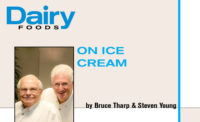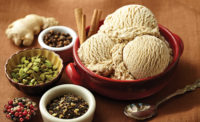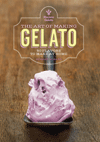Ice cream bar maker JonnyPops sticks to a winning formula
The founders of JonnyPops print inspirational messages on the wooden sticks of their clean-label ice cream novelties. They have a social mission, too: support treatment for substance abuse.

Erik Brust (left) and Connor Wray, along with two other friends, started Jonny Pops while they were students at St. Olaf College. In their senior year, they won the college’s Ole Cup and the Minnesota Cup, both of which honor entrepreneurialism.

JonnyPops cold-brews coffee in its plant to make the chocolate/coffee flavor.

JonnyPops are made with cream, cane sugar and fresh fruit. Strawberry is the most popular. A portion of the sales are donated to the Hazelden Betty Ford Foundation.





















Here’s a modern-day checklist for developing and selling a new food or beverage:
- Have an intriguing origin story
- Use only recognizable ingredients (nothing too chemical-sounding)
- Make it portable
- Be interactive with consumers
- Tie the product to a cause
That’s the formula behind the success of JonnyPops ice cream stick novelties. The founders hit all those points. They started their business while still in college, and they developed recipes using just five ingredients. As consumers finish the ice cream, a motivational message is revealed on the stick. A portion of every sale is donated to a substance-abuse support group.
Erik Brust (age 24) and Connor Wray (25) are the entrepreneurs leading JonnyPops, based in St. Louis Park, Minn. Though the company is only five years old, it already has established a fairly large footprint in the Midwest. It has found new customers and prospects by exhibiting at the Natural Products Expo West in Anaheim, Calif.
Customers are grocery stores, club stores, entertainment venues and schools. Supervalu, the Minnesota-based distributer and owner of supermarkets, has helped JonnyPops expand. Supervalu banners include Cub in the Twin Cities and Shop ‘N Save in St. Louis. Other customers include Jewel-Osco (Albertsons), Whole Foods, Kroger and Target.
While supermarket accounts are the main focus, JonnyPops is breaking into the school foodservice market. Adding this channel (and expanding it) will help the company smooth out the cyclical curves in sales and manufacturing.
“[School business is] not really a market generator for us. At best, it’s market neutral. But it keeps the plant busy,” Brust said.
Brust and Wray typically wear a coat and tie, but on the day Dairy Foods visited, Brust was in a JonnyPops logoed polo shirt because he was taking a shift on the production line. He asked Wray to dress down and remove his necktie. The two sat in a conference room strewn with packages and marketing materials and talked about how they are growing their young company.
Building brand awareness is very much a hands-on task. A lot of the effort fell to Brust and Wray, but recently they hired an individual to head up the marketing department.
“As a small company, we don’t have this massive marketing budget that we’re able to buy a bunch of advertising. We use a lot of word-of-mouth” and in-store demos, Brust said.
Pitching JonnyPops
The sales pitch for the pops starts with taste.
“We’re happy to taste ourselves compared to competitors and say, ‘Here’s why ours are better,’” Brust said. “Then we talk about simple, natural ingredients. Then we talk about the social mission.”
“It is very much about taste. We will be happy to compare our product to anyone else’s,” Wray said. “But it’s also about how can we create engagement with that consumer so that they’re truly enjoying the fact that they purchased the product, that they’re consuming the product, and [creating] as much loyalty there as possible so that we’re not just viewed by them as dairy-on-a-stick.”
A product with only features is not a brand, he said.
“At the end of the day, we all care about having the happiest consumers who enjoy the product. The next time they have a need for it, they are going to come back and buy it again,” he said.
JonnyPops competes in the natural foods category, and it prices the novelties as a premium product. The suggested retail price for a three-count box is $4.79 to $4.99.
“We definitely are on the premium side,” Wray said. “That being said, we work very hard to make sure the product is accessible across all supermarket channels, not just something that’s only appropriate to be found in extremely high-end specialty store or natural foods store.”
“If you take a look at our ingredients statement and you taste the product, we believe that people will understand why. Once you try it, you get why it is [a premium product]. It still takes a lot of work and effort on our part to keep the product there against competitive and inflationary pressures and all of that,” Wray said.
“We’re sort of straddling that line. We’re natural with our simple ingredients but we’re not organic or GMO-certified or any of that,” Brust added.
While he hasn’t ruled it out, Brust said the company isn’t pursuing organic certification or others, such as Rainforest Alliance or Free Trade. It is a natural instinct to try to please everyone, so the challenge for any company is to stay focused.
“One of the things that you find is, you start just checking boxes and all of a sudden your somewhat accessible product now costs $10 a box,” Wray said. “We make sure we can balance making the product fulfill our mission of delivering an excellent product people can feel great about eating but still bring it to the people who we think should be able to enjoy it.”
Engaging the customer
The JonnyPops motto is “A better pop for a better world.” Wray said he wants consumers to remember that they are buying a JonnyPop and to realize why it is different from another ice cream novelty.
“Creating that engagement and having us sell a brand contributes to a buyer’s category more than just a generic item,” Wray said.
The engagement comes from the inspirational and motivational messages printed on the stick. These include: Say thank you to a role model. Build someone up with encouragement. Brighten a stranger’s day with a smile. Stand up for what you believe in.
The company’s social mission is supporting the efforts of Hazelden Betty Ford Foundation, a center for treating substance abuse. JonnyPops donates a portion of its sales to the organization, which operates centers in nine states, including Minnesota and Illinois.
From ice cube trays to a real factory
Brust and his cousin Jonathan Jeffery had an idea to start an ice cream novelties company while they were still in high school. Jeffery died while attending college. Brust named the company he co-founded to honor his cousin Jonny, and he decided to donate a portion of the sales to the Hazelden Betty Ford Foundation.
At St. Olaf College in Northfield, Minn., Brust pitched his idea to friends and three of them signed on. Wray continued with JonnyPops after graduation in 2014 and the other two friends went separate ways.
The friends experimented with dairy-based recipes and made the first pops in ice cube trays in their dorm rooms.
“We never actually ventured outside of dairy. It’s sort of in our DNA from the beginning,” Brust said.
Fellow students provided a ready-made focus group, and they guided the young entrepreneurs in flavor development.
“College dorms make excellent venues for taste testing. No matter how bad it is, you will find plenty of willing people happy to take your free food,” Wray said.
In the summer, they sold pops at the Minnesota Zoo, at sandwich shops and farmers’ markets. Eventually, the students moved manufacturing from their dorm room to the basement of an event center with a commercial kitchen, which provided them with a walk-in freezer and walk-in cooler. They brought in a few pieces of their own equipment. There is no food science or dairy department at St. Olaf. So when the young entrepreneurs were trying to freeze something a little differently, they reached out to friends in the chemistry lab for liquid nitrogen.
The rented space allowed them to scale up and expand their customer base. The growing process was “nice and slow,” Brust recalled.
“The beautiful thing about being that scale and that size was that we were getting so much face-to-face interaction with our customers,” Wray said. “And so we continued to tweak and refine our product offerings including the brand and the packaging and the features that we were emphasizing. The truth is the product has always been a hit and has evolved minimally since the first iterations.”
In their senior year, the entrepreneurs moved into a warehouse bay that afforded them about 1,500 square feet of manufacturing space. In 2014, the year they graduated, they moved into their present location.
While students were providing opinions about flavors, Brust and Wray sought advice about how to manufacture food. The state’s Department of Agriculture provided guidance, as did other food processors.
“Minnesota’s obviously got a great food community and there are lots of companies. We just started getting on the phone, asking for help and networking,” Brust said.
As noted, St. Olaf doesn’t have a dairy program or a food science department. It does have an entrepreneurship competition called the Ole Cup, and Wray and Brust sought to win it. Wray tapped Prof. Roberto Zayas for advice. The first year Brust, Wray and classmates Andrew Sather and Kilian Wald applied for and won a Finstad Grant that provided $3,000 in seed money.
The students kept honing their product and process. Zayas remembers Sather sleeping through one of his 8 a.m. classes, and asked him why he was tired. Sather had spent the night making pops.
A Cup for ice cream
In 2014, Brust, Wray, Sather and Wald entered JonnyPops in the Ole Cup competition. They won the Cup (and $7,000) and that automatically entered them in the student division of the Minnesota Cup, the largest statewide new venture competition in the country. More than 1,500 entrepreneurs participate each year. JonnyPops won its division of the Minnesota Cup, which came with $20,000 in seed money.
“Erik and Connor were incredibly passionate about their product,” said John Stavig, who organizes the competition. He is the director of the Gary S. Holmes Center for Entrepreneurship in the Carlson School of Management at the University of Minnesota.
Brust and Wray used the competition to refine their marketing strategy and connect with mentors and investors who’ve helped them to build their business, Stavig said.
“They’re both very quick studies who ask great questions and soak up knowledge from their mentors. It’s been very impressive to see them launch and expand their operations like seasoned entrepreneurs. They’re quality individuals who’ve generously given back and are on their way to becoming role models for other young entrepreneurs,” Stavig wrote in an email.
Looking to the future
Brust and Wray said they are focused on growth.
“This entire team here is excited and fueled by growing,” Brust said. “That’s what gets you through the long weeks, let’s put it that way. We’re very happy with where we’re at and what we’ve grown this into. We’re just starting to get to the point where it’s super exciting.”
Brust added, “Compared to our beginning years, we’re focused on stabilizing right now.” By that he means making the company “more professional.”
Wray put it this way: “Each of our five years we’ve experienced extremely rapid growth. We’re reaching a size now where the two of us, just through sheer determination, willpower and hard work, can’t affect the amount that needs to be affected to reach even the short-term goals.”
They are addressing issues like developing a formal hiring process and instilling the company’s value and mission to all employees. Professor Zayas called Wray an “excellent” communicator and Brust “very entrepreneurial.”
Zayas said “they have managed to bring their skills together and different personalities and make it work to develop a very successful business that delivers a high-quality product that people seem to really like.”
Brust is realistic about the hard work that is ahead.
“It’s a very competitive category,” he said. “It’s easy to grow at first when you’re super small. And then you start getting to a point where there’s a lot of players in the field making ice cream novelties. We’re trying to focus on exactly what makes us different as well.”
Many ice cream entrepreneurs focus on making premium pints or sandwiches. JonnyPops’ stick format stands out, as does the social mission. They have managed their growth so far. If they stick with the formula, stick to their motto (“A better pop for a better world”) and take to heart some of the inspirational messages on the sticks, Brust and Wray should do just fine.
Looking for a reprint of this article?
From high-res PDFs to custom plaques, order your copy today!





















